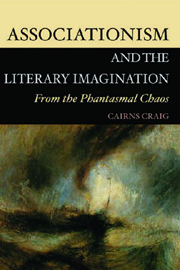Book contents
- Frontmatter
- Contents
- Acknowledgments
- Abbreviations
- Introduction: A Chain of Associations
- 1 ‘Kant has not answered Hume’: Hume, Coleridge and the Romantic Imagination
- 2 Signs of Mind and the Return of the Native: Wordsworth to Yeats
- 3 Strange Attractors and the Conversible World: Hume, Sterne, Dickens
- 4 The Mythic Method and the Foundations of Modern Literary Criticism
- 5 Chaos and Conversation: Pater, Joyce, Woolf
- 6 The Lyrical Epic and the Singularity of Literature
- Bibliography
- Index
6 - The Lyrical Epic and the Singularity of Literature
Published online by Cambridge University Press: 12 September 2012
- Frontmatter
- Contents
- Acknowledgments
- Abbreviations
- Introduction: A Chain of Associations
- 1 ‘Kant has not answered Hume’: Hume, Coleridge and the Romantic Imagination
- 2 Signs of Mind and the Return of the Native: Wordsworth to Yeats
- 3 Strange Attractors and the Conversible World: Hume, Sterne, Dickens
- 4 The Mythic Method and the Foundations of Modern Literary Criticism
- 5 Chaos and Conversation: Pater, Joyce, Woolf
- 6 The Lyrical Epic and the Singularity of Literature
- Bibliography
- Index
Summary
One of the major innovations of twentieth-century modernist writing is the non-narrative long poem – what I have previously described as the ‘lyrical epic’. Its emergence can be traced in Yeats's efforts to shape all of his poetry as a single epic totality in which each poem will stand as a contributing lyrical moment, a macrocosmic ambition which is then reflected in the microcosm of individual poems which consist, like ‘Nineteen Hundred and Nineteen’ or ‘The Tower’, of a sequence of lyrics not obviously continuous with one another either in content or verse form. The possibilities of the lyrical epic begin to be explored in Ezra Pound's draft Cantos published in Poetry (Chicago) in 1917, partly under the influence of Joyce's Ulysses, with which both Pound and Eliot were familiar from an early date because of their involvement in its serial publication. It then achieves its most influential (if accidental) form in Pound's editing of T. S. Eliot's The Waste Land in 1922, whose tactics and techniques are developed in the following forty years by poets from widely different cultural backgrounds: Hugh MacDiarmid's A Drunk Man Looks at the Thistle (1926), David Jones's In Parenthesis (1937), William Carlos Williams's Paterson (1948–52), H. D.'s Helen in Egypt (1961), not to mention Eliot's own Four Quartets (1935–42) and the 108 completed poems of Pound's Cantos.
- Type
- Chapter
- Information
- Associationism and the Literary ImaginationFrom the Phantasmal Chaos, pp. 285 - 308Publisher: Edinburgh University PressPrint publication year: 2007



